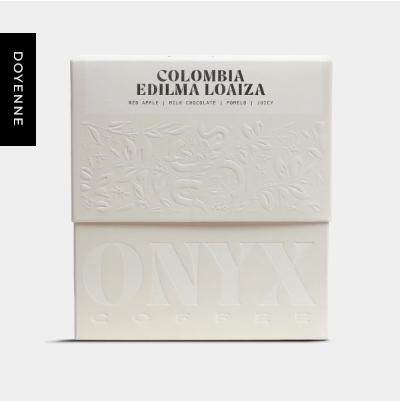
About this Coffee
Edilma Loaiza grows coffee in the soaring heights of Buesaco, Narino. For the last 25 years, Edilma has grown coffee while raising two children on a parcel that she inherited from her parents. Her wealth of experience paired with the high elevation of her farm produce a complex sweetness in the cup, reminding us of pomelo and milk chocolate, with a lingering juicy finish.
Edilma Loaiza is a remarkable coffee producer who owns and operates the esteemed Granadillo coffee farm in Buesaco, Colombia. Situated at an impressive altitude of 2120 meters above sea level, Granadillo enjoys a prime location for cultivating exceptional coffee at high elevation. With extensive experience of over 25 years in coffee farming, Edilma’s journey began when she inherited a small parcel of land from her parents at the age of 25. Determined to make the most of her inheritance, she ventured into coffee production, driven in part by the government’s initiatives to promote coffee cultivation in regions affected by violence.
As a single mother of two, Edilma not only manages her farm with passion and expertise but also takes it upon herself to impart her knowledge and love for coffee to her children. She recognizes the importance of passing down this valuable heritage to the next generation. Her oldest son, in particular, shares his mother’s fascination with specialty coffee and demonstrates a keen interest in the intricacies of the trade. He has been diligently attending educational sessions at Pergaminos lab in the nearby town, immersing himself in the art of cupping and analyzing green coffee samples.
The lot produced by Granadillo is a testament to Edilma’s commitment to quality. Employing meticulous processing, the coffee cherries are fully washed and dried on patios.. This methodical approach ensures that each lot from Granadillo exudes exceptional preparation and profile.
Edilma’s story exemplifies the resilience, determination, and dedication of individuals who strive to create exceptional coffee.. Through her commitment to her craft and her determination to pass on her knowledge to her children, Edilma Loaiza has not only established Granadillo as a renowned coffee farm but has also contributed to the rich heritage and vibrant coffee culture of Buesaco, Colombia.
WASHED PROCESSED COFFEES
The washed process begins with coffee cherries delivered to the washing station, both from the primary market or from farmers bringing their coffee directly to the mill. The cherries are inspected, and an initial quick round of hand-sorting separates the defective coffees before placing them into the hopper. They are then funneled to the depulper, which removes the fruit from the seeds (beans). After that phase is done, the coffee is fermented underwater for approximately 12-36 hours. During this fermentation, a microbial de-mucilagation takes place, which allows the outer fruit and pectin layer to break down, making the coffee easier to dry. This phase also crucially alters the organic acids within the coffee, as sugars and organic acids are transformed, with the best washed coffees maintaining their complex fruit esters. Once the fermentation is complete, the parchment is emptied into the washing channels, where it is agitated with rakes to remove the last of the fruit layer. During this step, the water is refreshed to ensure its capability of separating the fruit layer from the seed. Once the washing is complete, the coffee is taken to the raised drying tables for sun drying.